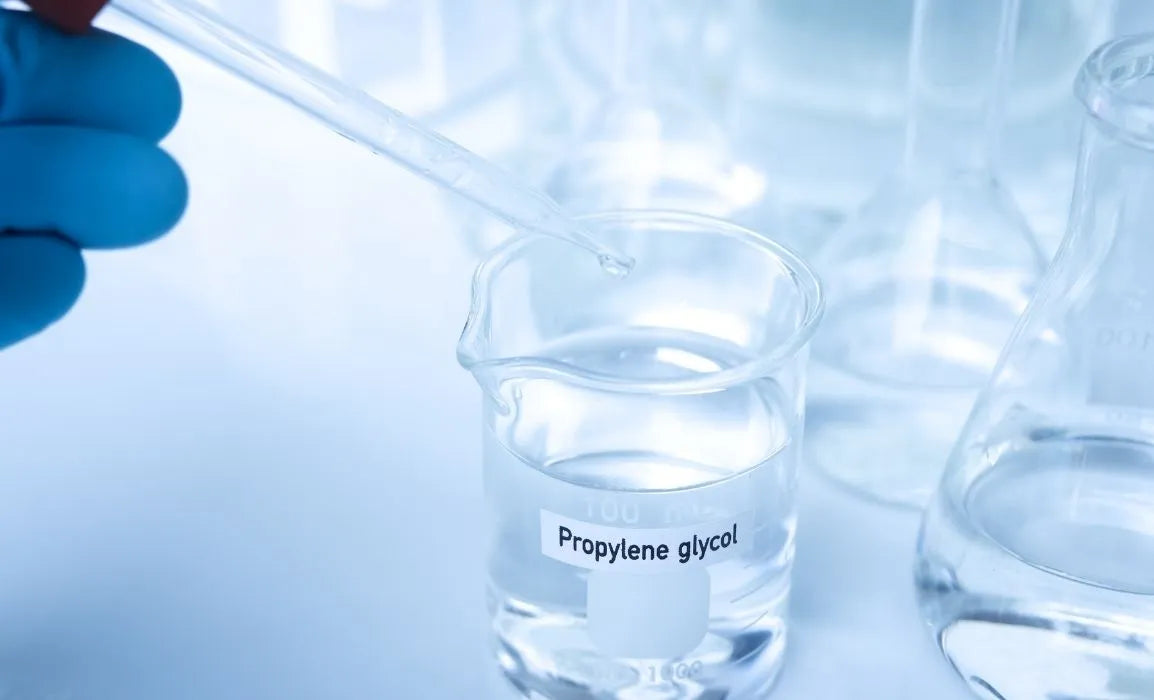Propylene Glycol in Skincare

Introduction
Propylene glycol is a clear, colourless and tasteless viscose liquid that easily dissolves in water. It is a synthetic created by mixing water with propylene oxide, a derivative of hydrocarbons. Propylene glycol is also used as a humectant, preservative, solvent or emollient in numerous formulations including creams, lotions, serums etc.
What is propylene glycol?
Propylene glycol (which is a humectant) is used in cosmetics and skincare products to retain moisture in the formulations. It is a slightly sweet, odourless, colourless liquid manufactured in the viscous form. The synthetic form that fits in the skin pulls with water when it is necessary by the skin and gets inside. Helps to minimise peeling and dry skin, which in turn will enhance luxurious softness.
What does propylene glycol do in skincare products?
Propylene glycol has been utilised in skincare for the roles of - humectants, emollients and preservatives as well as solvent and a skin product enhancer for creams/lotions etc. This is amazing for the skin. It is an antimicrobial agent as well, which also can help to stabilise the product formulations by preventing harmful bacteria from growing. Also, anti-ageing products are produced with Propylene glycol.
Also read: What are humectants?
Propylene glycol benefits in skincare
Here are the main propylene glycol benefits in skincare:
- Humectant: In smaller concentrations, propylene glycol actually gets underneath the skin and pulls water up into the stratum corneum. It helps make your skin surface look well moisturised and dewy fresh.
- Increases benefits of other ingredients: Propylene glycol is also a binding agent which allows other active molecules to penetrate deeper into your skin.
- Minimal hydration: Acting as a humectant, this molecule apparently provides a little moisturisation and soothes the skin while creating a possible non-sticky sensation.
- Visible action: Because of its hygroscopic properties, it helps with skin age in the targeted area. The older you get, the more your skin dries out due to loss of natural moisturising factor (NMF) resulting in wrinkles becoming more pronounced and causing dry or rough gritty skin types.
- Enhances absorption: Propylene glycol easily combines with the components of the cosmetic formula to help improve effectiveness.
- Great for acne-prone skin: Propylene glycol is non-oil based, making it perfect for acne-prone people.
- Preventing water loss: Propylene glycol acted as an emollient and electrostatically stabilised nano-particle dispersion that reduced transepidermal water loss by forming a thin film on the surface of the skin, hence keeping it moist and supple.
- Helps lessen the appearance of spots over time: Due to its moisturising properties, propylene glycol nourishes the skin, helping to lessen the appearance of marks and acne spots.
Precautions while using propylene glycol
Precautions while using propylene glycol skincare products
- Always patch test: Propylene glycol is considered safe for most skin types, but as with any ingredient, some people may develop irritation or an allergic response. After patch testing is all clear, then continue with your full product application.
- Beware of irritation: If redness, burning or too much dryness occurs after using a propylene glycol-containing product, stop its use. This ingredient is supposed to hydrate and lighten the skin, so if it's performing the opposite, it means your skin is sensitive.
- Sensitive skin warning: If you have sensitive skin or any condition such as eczema or rosacea, be very careful. When you use an e-liquid containing propylene glycol, it can occasionally cause irritation to people with sensitive skin. If you have any skin issues, it is always better to go for lower concentrations.
- Don't overuse: Whilst propylene glycol traps moisture, overdoing it with the number of products containing propylene glycol may stress your skin. Keep it balanced and only use one product with the same active ingredient unless you know your skin will tolerate it.
- Look for other ingredients: Propylene glycol is usually used with other active ingredients in skincare products. By knowing the full ingredient list beforehand, you can prevent any possible sensitivities, or unwanted interactions with other products you are using.
Conclusion
Propylene glycol is found in plenty of skincare and beauty products, especially the ones designed to moisturise. This ingredient is considered safe and beneficial - but you will have to be cautious if you have sensitive skin or eczema.

